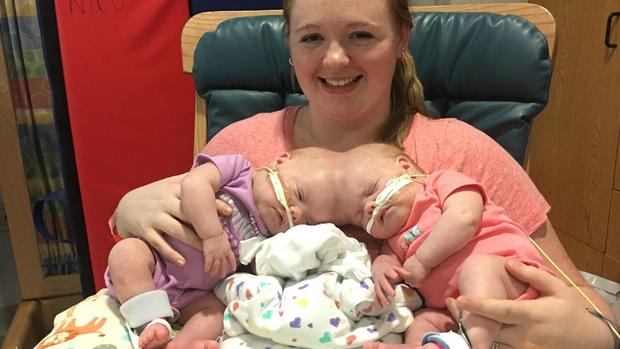Conjoined twins to be delivered and separated; only one may survive
Conjoined twin girls are scheduled to be delivered and separated today in a Colorado hospital. The C-section delivery at 32 weeks is risky for both, and doctors expect that the operation to separate them immediately afterwards will leave only one surviving baby girl.
Their mother, Amber McCullough, has written about their ordeal online. She says one of the twins, Hannah, shows normal function and organ development in ultrasounds. The other twin, Olivia, has only a single ventricle in her heart and a genetic abnormality called Dandy-Walker syndrome which would affect brain development.
Because of the physical differences and the way the twins are attached, doctors say they may be able to save Hannah using a surgery called an EXIT procedure -- Ex Utero Intrapartum Treatment -- before cutting the umbilical cord. They would separate the conjoined twins immediately, but while the surgery could save Hannah, Olivia would not survive. McCullough says she was told Olivia's heart defect was "not likely compatible with life."
"We are embarking on a new future with much happiness, love, and sorrow," McCullough said on her Facebook page as she flew to Denver on August 2 to prepare for the delivery of the twins at the Colorado Fetal Care Center at Children's Hospital Colorado. "I march forward to grieve Olivia, love on her, and create memories of her far too short but so very beautiful life. I march forward to battle for Hannah's life with all my might and all my prayers." McCullough lives in Minnesota with her 6-year-old son.
Conjoined twins develop when one fertilized egg begins to separate into genetically identical twins soon after fertilization, but the separation does not complete. They are still very uncommon -- and their chances for survival are even more rare. According to the University of Maryland Medical Center, which performed the first conjoined twin separation in 1986, the overall survival rate is five to 25 percent for conjoined twins. Forty to 60 percent arrive stillborn and 35 percent only survive one day. One in every 200,000 live births are conjoined twins.
This separation surgery has been carefully planned based on ultrasound images. The incision between the two girls is expected to leave Hannah with parts of Olivia's body: her lower spine, attached Hannah's chest and her malformed leg, according to the posts. Further operations will be needed to correct that.
"I am determined not only to do all we can to keep [Hannah] alive but also to ensure she is happy and as comfortable as possible. That being said, naturally there will be some uncomfortable parts of this journey in which case we will also lean on the doctors to manage her pain," McCullough wrote on the GoFundMe page she set up to raise money for living and medical expenses during her pregnancy.
When she found out she was carrying conjoined twins, McCullough said decided to have the babies despite the high risks and advice to terminate the pregnancy. On social media, she said she is on medical leave due to her complicated pregnancy from her job an attorney serving low-income communities; she was also an Army Reserve Captain.
McCullough said she has been preparing for both the loss and birth for some time, but is hopeful for the survival of the more fully-formed twin, Hannah, after the separation.
"I have not and refuse to give up on my girls. I have been in a postion [sic] where I have had much pressure to abort at times and I refuse. Instead, I choose to embrace their life while they are here and fight like crazy to do all I can for my daughters," she wrote.
